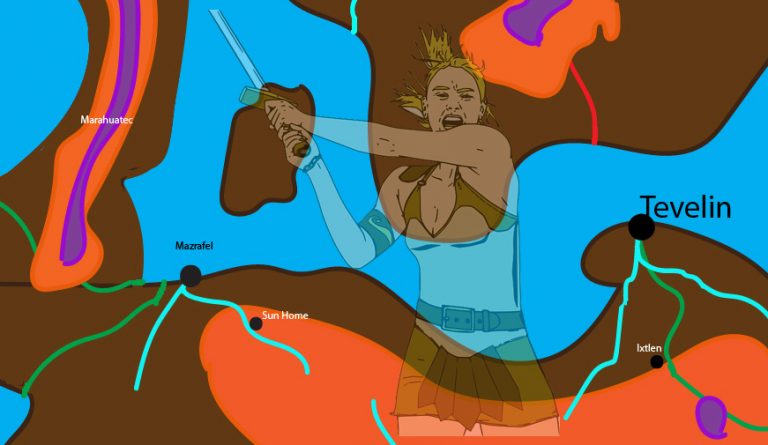On the Worship of Umnam and Umnan
“Why were you in such a hurry to leave the last village?”
Roban looked at his daughter. She was also his apprentice in his trading business. He drove his wagon on a circuit amongst the towns and villages that extended hundreds of miles and weeks in time, buying and selling things that were available in one place but needed in another.
This is a work of fiction. All persons, places, and events and products of my imagination. Copyright © 2012, Henry E. Neufeld
He had convinced himself that, if his oldest child had been a boy, he would not have had to deal with so many questions. When he mentioned this conclusion to his wife, she broke into gales of laughter. But right now, whether it was sensible or not, he wished for a practical, down to earth, boy child. Yet he knew that nothing short of a real answer would satisfy his daughter.
“Because,” he said after a pause, “tonight is the heathen festival of their evil god Umnan.”
“Why do you call Umnan evil?”
“Because he is an evil god.” Roban tried to sound final, but he knew it wasn’t going to work.
“But Umnan sounds just like our god Umnam. There are lots of words that end in ‘n’ in these southern villages that end in ‘m’ back home.”
This made Roban think. Of course he’d noticed this before. It was essential in adjusting his speaking so he didn’t sound so foreign. Sounding foreign was bad for sales. He paused again, this time for a couple of minutes. He covered the pause by pretending to look over the oxen and the load, making sure all was well.
“It may sound like that,” he said finally, “but it isn’t really. Umnam is kind, just, and loving. He preserves us and defends us from the hostile spirits of nature. We sacrifice to him out of our love and thankfulness. Umnan is evil and nasty, and is out to get everyone in sight. He uses the hostile spirits of nature, the wind, storms, fire, and water. If his worshipers don’t sacrifice to him regularly, he will strike out and kill them.”
He hoped this would divert her, even though he hadn’t answered the question of why he was so determined to leave their village before the feast.
Temporarily, it seemed to work.
“Why?” she asked. This was normally his least favorite question. Right now, however, it offered a long diversion.
“Do you remember the story of the great flood?”
“Of course I do, daddy!” And that was very true. She tended not to forget things—anything, in fact—and she loved the ancient stories.
“Well, give me the outline.”
“Men were evil, so the gods sent a flood to destroy them. But Umnam saw that some of his people were obedient, and sent them warning by the prophet Urvam. They fled to their boats and rode out the flood. Many perished, but Umnam preserved the faithful and brought them to land again. When they reached land, they still had to face falling branches and unstable rock piles. But the sun came out again and a rainbow appeared, which was the sign that Umnam loved them and would preserve them forever.”
It was an admirable summary. Roban had hoped his daughter would tell the story in more detail, thus taking up more time and giving her an opportunity to forget her original question.
“Quite correct,” he said. “But the story of the great flood told in the south is quite different. Their story says that Umnan was angry with his people, and chose to destroy them with storm and flood. But a great hero, Urvan, learned that the flood was coming, and rode downstream on his horse ahead of the waters, warning his people to flee to their boats. Many were lost in the flood, but the survivors made it to shore. At the last moment the chief’s child was struck on the head by a falling branch, loosened by the wind. Thus the people learned that Umnan demands his price.”
He paused again. “You see how they pervert the truth with their demonic story?”
Several minutes of silence ensued. Roban found he approved, but at the same time it made him nervous, almost like the moments while one waited for a wild beast to strike. Of course, this was his daughter!
“But if you look at it differently,” his daughter said finally, “it could be the same story.”
“No, it couldn’t!” Roban came back instantly. “The two stories are not alike at all!”
And then it came. “I see,” said his daughter, deceptively calm. “But you still haven’t told me why you wanted to be out of the village before the feast.”
“Well, I’ll tell you. I didn’t want to, but I will. Every year at the feast, one child is chosen as a sacrifice to Umnan. That is evil! If you were in town, I guarantee they would choose you!”
The daughter truly did believe that was evil, but she still thought the stories were much too much the same.
I wonder whether Umnan actually wants a child sacrificed to him, she thought. Maybe a branch just fell, and that’s the way people interpreted it. But she was actually more cautious than her father gave her credit for, and she didn’t say it out loud.
(This is an exercise in taking a different point of view on a story. You should recognize similarities and dissimilarities with the biblical story of the flood, focusing on the lectionary passage Genesis 9:8-17. I’ll be discussing this in The Way Sunday School Class at First United Methodist Church, Pensacola, February 26, 2012. We ask members to bring various responses, art, poetry, stories, other thoughts.)
Discover more from The Jevlir Caravansary
Subscribe to get the latest posts sent to your email.




